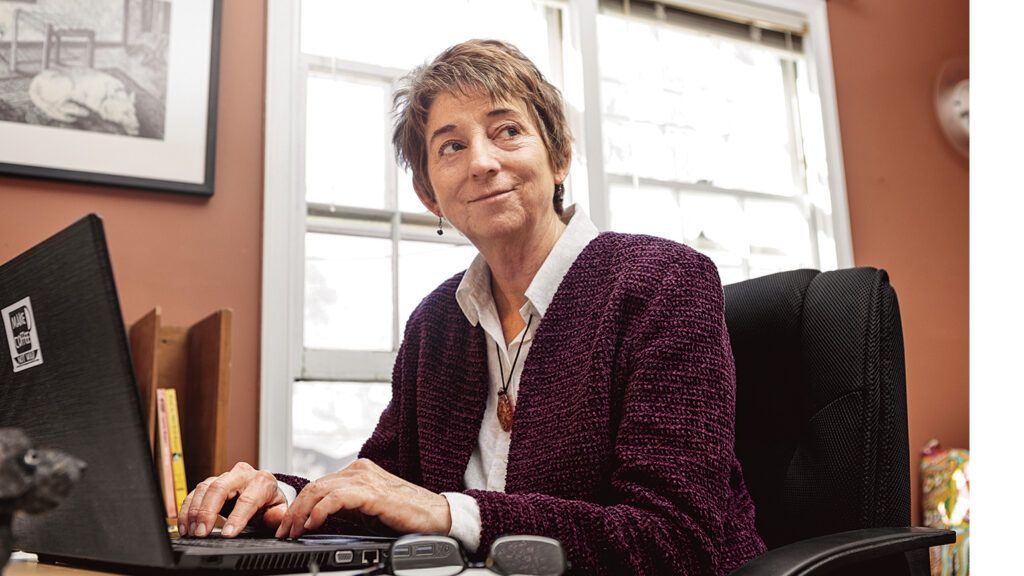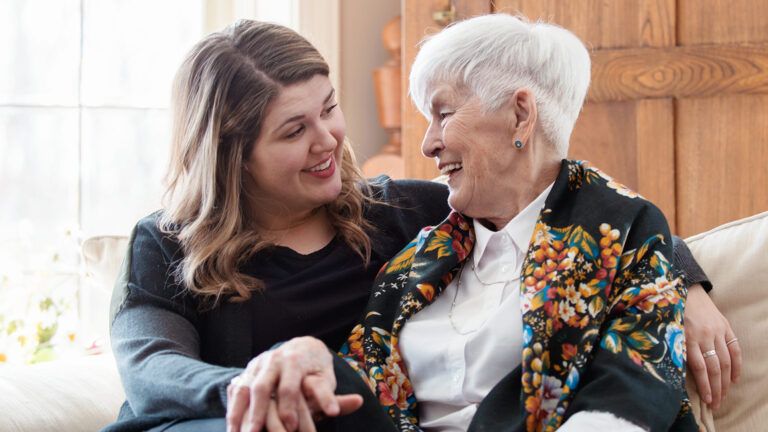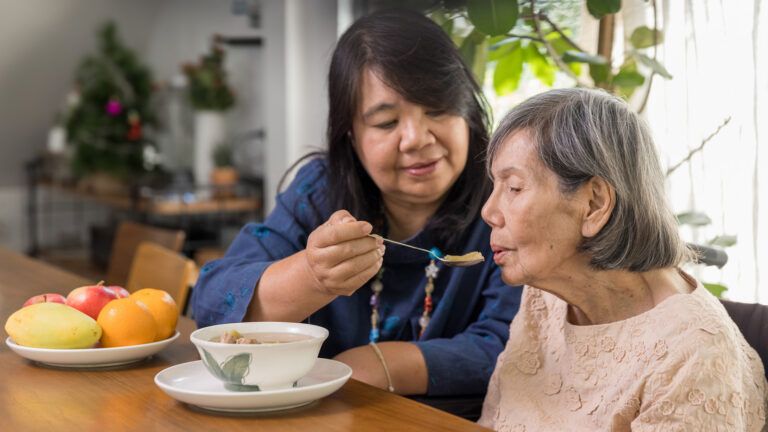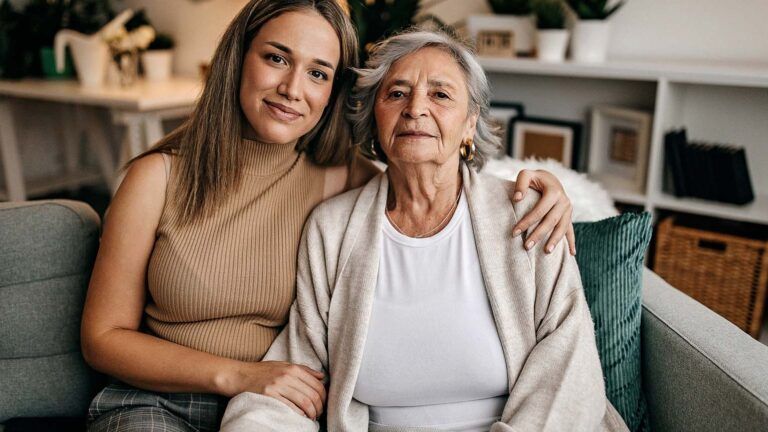I went out to my car in my parents’ driveway early that morning last February and tossed my bag inside. Then I turned to my mother. Her freezer was filled with dinners I’d made. I’d picked up her prescriptions and run a few last errands. I’d warned her to watch out for scam artists calling after they saw the obituary. It was time for me to go home to Kansas City, go back to work. But it was hard to leave, knowing Mom would be living all alone now after almost 60 years of marriage.
We’d buried my dad just a few days earlier in a military service. He was a Korean War veteran, a hard-working man who’d driven an 18-wheeler for Caterpillar for four decades. I was worried about Mom. She had worn herself out taking care of Dad for the past two years, ever since he’d been diagnosed with Alzheimer’s.
I reached out to hug her goodbye. She felt small and frail in my arms. “Please take better care of yourself,” I said softly. “I don’t want to have to come back in two months and do this again.” I didn’t want to lose her too.
Get practical spiritual advice for everyday challenges in Spiritual Remedies
I glanced past her, to the house. In the 35 years since I’d left our small Illinois town, I’d been back no more than a couple dozen times. My relationship with Mom was strained for many of those years. I wanted her to see me as my own person rather than an extension of her own desires. It didn’t help that we were both introverts who didn’t handle conflict well and got prickly when challenged.
Mom had hoped that I would marry, live nearby and start a family, as she had done in the 1950s. She’d married at 18. Marriage wasn’t a priority for me. A career as a writer—that was my goal. I left home at 21 and moved to Kansas City, Missouri, to pursue it.
Dad was 48 then, a familiar sight tending the yard on his riding lawn mower, wearing his Caterpillar hat. Mom had returned to school and was just starting a nursing career at 42.
I built a life as a writer in Kansas City. In her own way, Mom was as independent as I was. She taught herself to paint in her 50s and, on my annual Christmas visits, would show me her artwork and the ribbons she’d won in local competitions.
One time she handed me a photo of herself in purple leggings and white running shoes. “I’ve started running,” she said. Living 400 miles away, I didn’t know about new interests she’d taken up any more than she knew about mine, and the realization made me a little sad.
With each visit, I’d notice another change. Mom needed glasses. Dad got a knee replacement. His hair turned white.
Eventually I made peace with the fact that my mom would never be who I wanted her to be. She seemed to do the same with me. I took more interest in her art and sewing projects. When I bought a house, Mom weighed in on paint and fabric swatches and sprang for a new sink for my kitchen. We settled into an easier relationship. “I’m glad we get along better,” Mom told me. “I don’t have to walk on eggshells now.”
In 2014, at age 82, Dad was diagnosed with Alzheimer’s. He declined quickly. The stress of being his caregiver took a toll on Mom. She had chronic kidney disease, and her kidney function numbers slipped. She was depressed. I told her to get some in-home assistance, but she refused, independent as always. My brother Rick lived a mile from them, and my other brother, Steve, lived an hour away. They helped out and didn’t share all of my concerns.
“You worry too much, Deb,” Rick said, noting that I was welcome to move back to Illinois to lend a hand.
It weighed on me—the thought that one day I might not have a choice. I prayed often, asking God to be there for my parents when I couldn’t. I saw them more often, delivering bags of frozen chicken and veggies I’d prepared so Mom could throw them in her slow cooker. I made grocery and pharmacy runs and suggested ways she could simplify her life, like getting dinners delivered by Meals on Wheels. “We don’t need that,” Mom would say to nearly everything. She didn’t like the idea of having strangers in the house.
Then in July 2015, Mom and Dad both ended up in the hospital. Dad had a bleeding ulcer. Mom’s kidney numbers were at dialysis level. I stayed with them while they were recovering. Before I went back to Kansas City, I made Mom promise to hire a housecleaner.
She found someone on Craigslist. A woman named Amber. “She does a good job,” Mom reported after Amber’s first visit.
Just knowing Mom wouldn’t be doing everything herself, that there would be one more person checking in on my parents, was a huge relief.
When Rick’s name flashed on my phone one morning the following January, the usual list of fears ran through my head. Had Mom fallen? Had Dad wandered off in the cold? The news was worse: Dad had died in his sleep.
I stayed for a few days after the funeral, not wanting to leave Mom alone. But now I had to. I stood in the driveway and hugged her for a long time. Please comfort Mom and keep her safe, I prayed as I drove away. At least she had Amber.
Back in Kansas City, I called Mom several times a week, telling her she should volunteer at the hospital or take an aquatics class at the rec center. Something to stay active. She told me she was plenty busy writing thank-you cards and catching up with friends.
Every time we talked, she had something new to tell me about Amber. “She’s always interested in what I’m doing,” Mom said. Amber opened up to Mom, confiding that she’d been just a teen when her mother died. Amber’s life was still a struggle, raising two sons as a single mom.
Mom said she’d printed flyers for Amber’s business. “Amber helped me rearrange the living room,” Mom mentioned during another call. “And she stayed for dinner. I cooked one of those frozen dinners you made.”
Another time, Amber showed up in tears because she owed a large sum on her income taxes. “I helped her figure it out,” Mom said with an air of confidence.
She missed Dad, but without the stress and isolation of caring for him, Mom was actually thriving. She hadn’t felt like going to church. Now she went every Sunday. She was going out, renewing old friendships. And with Amber, she even seemed to have made a new friend. Maybe my brothers were right. I should relax. Trust that God was looking out for Mom.
One day on the phone, Mom mentioned that two of her rings were missing from her dresser drawer.
“Has anyone been in the house?” I asked her.
“No. Nobody but Amber.” “Don’t worry,” I said. “I’m sure they’ll turn up.” Still, it seemed odd. Mom wasn’t the type to mislay things.
Two weeks later, she still hadn’t found them. I tried to think what could have happened. “Do you think Amber could have taken them?”
“She’d never do that!” Mom said. “Just the other day, she was asking about my rings. She’s got enough to worry about, poor thing. I loaned her $200 so she could keep her electricity on.”
The hair on the back of my neck stood up. I pressed Mom a bit further, but that only upset her. I couldn’t get a hold of Rick.
Something wasn’t right. Part of me wanted to hop in my car, drive straight to Illinois and confront Amber. But what would that accomplish? I didn’t have any proof. I kicked myself for not having visited Mom since the funeral. Maybe I would have noticed something.
How could she have let this woman get so close to—
I stopped and thought of all the conversations I’d had with Mom. Most of them consisted of me giving her advice, pushing her, telling her how she needed to take care of herself…when what she’d needed most was someone to listen. Like Amber did.
A week later Amber called my mom and said she’d met a guy who had what she thought might be Mom’s rings and was trying to sell them.
“He wants $1,500,” Amber told Mom. “Can you get the money? I’ll come pick it up.” Mom played along.
When Amber arrived, Mom challenged her story until Amber finally turned over both rings.
“I was your friend,” Mom said. “Why would you steal from me?”
“I needed the money,” Amber replied.
Mom fired her then and there. “I told her I forgave her,” Mom said when she called to tell me what had happened. “I feel bad for her. She must have really been desperate.”
“You did the right thing,” I said. I didn’t admonish her to be more careful or criticize Amber. I just listened.
Mom refused to file a police report. I wasn’t as forgiving. Searching the Illinois courts database online, I discovered Amber’s felony for retail theft. I called Amber and left a message on her voice mail: “Don’t ever call my mother again. My brothers and I are involved in Mom’s life, and we’ll be paying attention.”
That was the last we heard of Amber. I’m grateful for the experience. It gave me a new understanding for Mom and for how God cares for us. I visit Mom every two months, and I don’t lecture her on estate planning, veterans benefits or exercise. I listen. I love hearing stories of her childhood or life with Dad. She’s taken up drawing and likes to share her latest pieces with me.
On my most recent visit, I didn’t hurry back to Kansas City as usual. Mom and I lingered over coffee.
Finally I hugged her goodbye. “I can’t wait to come back in two months,” I said, “and do this again.”
7 Ways to Protect Your Senior from Fraud
For more inspiring stories, subscribe to Guideposts magazine.





